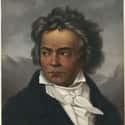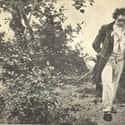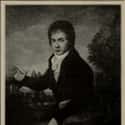-
(#18) Almost 100 Years After Beethoven's Death, German POWs Brought His Music to Japan
Not a sad fact from the life of Beethoven, but strange enough to merit mentioning, is the way in which the composer became a cultural staple in Japan.
Japan wasn't exposed to any Western classical music until the end of the 19th century, and Beethoven's music didn't make there until WWI. Japan, siding with Britain and the Allies in that war, demanded Germany surrender a base in Qingdao, China, a port city on the Yellow Sea. Germany refused, so the Japanese seized it, capturing 4,000 POWs.
A thousand of these Germans were sent to Naruto, Japan, where they spent their time as productively as possible. A group of them formed an orchestra and performed various pieces, with a focus on Beethoven. On June 1, 1918 the orchestra publicly performed Beethoven's Ninth for the first time on the continent of Asia. Since that first performance, the piece has achieved such stature in Japan it is considered an iconic and indelible part of Japanese culture, despite being German.
It is now a tradition for Japanese orchestras to play the Ninth at some point in December. There are several explanations for this, one being musicians face financial difficulties at year end and know a performance of the Ninth will sell out. Unique to the Japanese tradition, the audience frequently sings the "Ode to Joy" chorale in German along with the choir Typically, Beethoven's Ninth will be performed hundreds of times in December by orchestras all across Japan, with many playing its final note as the New Year begins.
-
(#11) His Brother Died Young And His Attempts To Raise His Nephew Created Family Turmoil
When Beethoven's brother, Carl, died from tuberculosis in 1815, Ludwig attempted to get custody of his nine-year-old nephew, Karl (very imaginative naming, Carl). He considered his late brother's wife an unfit mother; she had an illegitimate child with another man before her marriage and was convicted of theft. On top of this, Carl stipulated in his will that he would like Ludwig and his wife to share custody of Karl.
Although Beethoven was successful in gaining custody, the case dragged on until 1820. In the end, he had a contentious relationship with Karl, who couldn't fulfill his uncle's desire to pursue a music career because he had no musical talent. Karl's suicide attempts and frequent requests to be taken to his mother's home devastated Beethoven. The final nail in the coffin was his decision to join the military.
In January 1827, Karl enlisted in the Austrian army, unemotionally bidding farewell to his uncle. Beethoven died two months later. Karl van Beethoven died of liver disease in 1858, at 52. Despite the tension in their relationship, Karl was present at, and participated in, his uncle's funeral.
-
(#7) Most Of His Close Friendships Were Mired By His Inability To Understand Human Behavior
According to Grove Music Online, a digital resource of Oxford University Press, Beethoven was incredibly impatient and mistrustful. These qualities, combined with a pronounced inability to discern motive, put tremendous strain on many of the composer's personal relationships. Compounded misunderstandings, exacerbated by Beethoven's temper, led to serious, long-lasting arguments and, in some cases, fist fights.
A look at Beethoven's pattern of friendship shows the effect his mistrust and skepticism. His two closest friends - Franz Gerhard Wegeler, a physician Beethoven knew since childhood, and theologian Carl Amenda - lived in different countries for most of their adult lives. Stephan von Breuning was his closest friend in Vienna, and he and Beethoven went through years of not talking to one another due to tension in their relationship.
-
(#16) He Was A Heavy Drinker And Died In Agony, But No One's 100% Sure About What Killed Him
Beethoven's maternal grandmother and father were alcoholics, so it's not surprising his autopsy showed he died from cirrhosis of the liver. In his final days, he suffered from ascites, an accumulation of fluid in the abdominal cavity, a result of cirrhosis that causes gross swelling. Yet cirrhosis has numerous causes, so which one did Ludwig have?
As an adult, Beethoven drank every day, concluding each evening with a trip to the local tavern. Among other beverages, he drank a lot of wine, which at the time was laced with lead to provide cheap product with a better taste (the practice was illegal even then, but still widespread). Beethoven's chronic drunkenness probably explained his mood swings, hostility, and depression. Coincidentally, his nephew, Karl, also died at a young age from liver-related complications.
Of course, not everyone agrees with the death-by-alcoholism diagnosis. According to a New York Times article from 2010, while Beethoven was certainly ill and suffering from liver problems, there has yet to appear irrefutable evidence of his exact cause of death.
-
(#4) His Father's Alcoholism Forced Beethoven To Support Himself In His Early Teens
Beethoven's father was a tenor and musician employed in the court orchestra at Bonn. He was competent and punctual until drinking harmed his voice and ruined his reputation. In the early 1780s, his standing, already in decline, was further tarnished when he was caught in a forgery scandal. Although he wasn't prosecuted, his music career deteriorated completely and he became a notorious, undesirable figure.
At least once, Ludwig had to intercede with police to prevent his father's arrest for public intoxication. Beethoven understood from a young age he would have to earn a living for himself, as he couldn't rely on his father. In 1784, at age 14, he was appointed Elector of Cologne's Assistant Official Court Organist, and received a modest salary. Beethoven's mother died in 1787. His father got a salary as an act of charity and, in 1789, Beethoven obtained court permission to directly receive half his father's salary for household expenses, as he was essentially now supporting the family (he had two younger brothers, the only of his seven siblings to survive infancy).
At some point, the court officially banished Johann von Beethoven from Bonn, although this demand was never enforced. Ludwig left his hometown in late 1792 for Vienna. His father died a month afterwards on December 18, 1792.
-
(#17) No One Knows What His Last Words Were But There Are Some Wild Theories
Beethoven died on March 26, 1827. There are major discrepancies as to who was present, what was said by Beethoven, and even his state of mind. One biographer's account uses the weather and composer's final moments to create a bombastic drama in keeping with the tone of Beethoven's music:
"At this startling, awful peal of thunder, the dying man suddenly raised his head from Hüttenbrenner's arm, stretched out his own right arm majestically—like a general giving orders to an army. This was but for an instant; the arm sunk back; he fell back; Beethoven was dead."
Several last words are attributed to Beethoven; which ones you read all come down to the source you're reading. One account has him saying "Pity, Pity - too late," upon hearing about a gift of a case of wine from his publisher.
"Applaud, my friends, the comedy is over," spoken in Italian to mimic the Commedia dell'arte, seems like a stretch for a dying man, but someone claims he said it. He may also have uttered "I shall hear in heaven." certainly appropriate final words for him.
New Random Displays Display All By Ranking
About This Tool
Beethoven has been away for more than 200 years, almost everyone in the world knows his name and music. All the modern musicians are still fascinated by his beautiful music and touching melody, but few people know how tragic his life has been. Beethoven spent his childhood under the strict and demanding education of his father, which created his stubborn, sensitive personality. When his music career began to develop, he was hit by fate again, he was deaf.
He has almost never heard of his own work. After his deafness, he tried his best to avoid any social activities. If a musician cannot hear his own work, what could be more cruel torture? The random tool shares 18 sad facts about the miserable life of Beethoven.
Our data comes from Ranker, If you want to participate in the ranking of items displayed on this page, please click here.
















